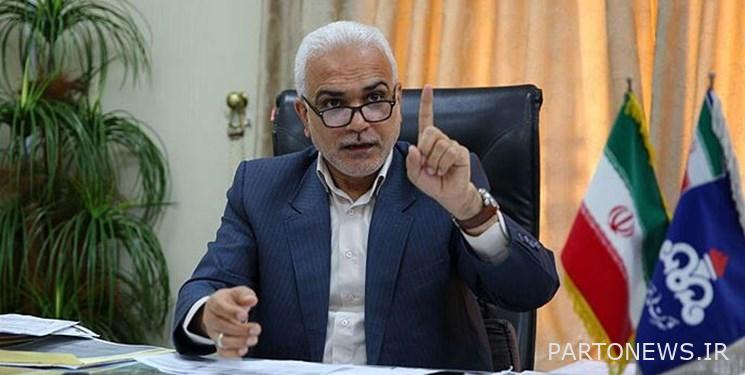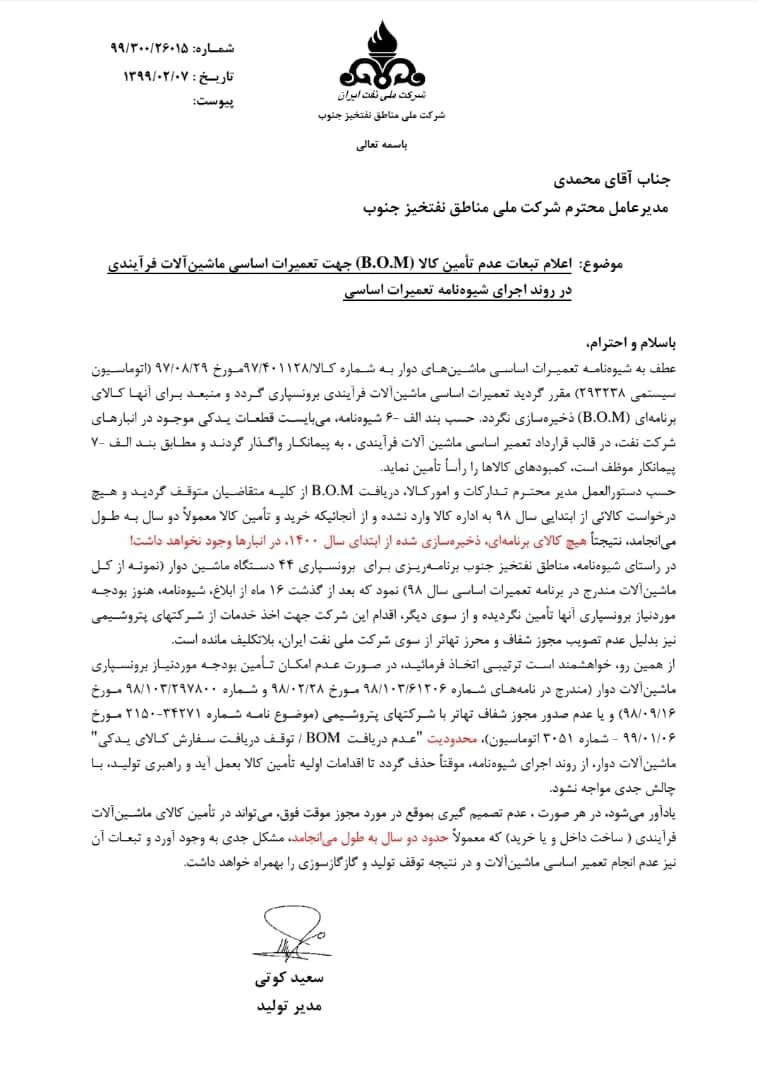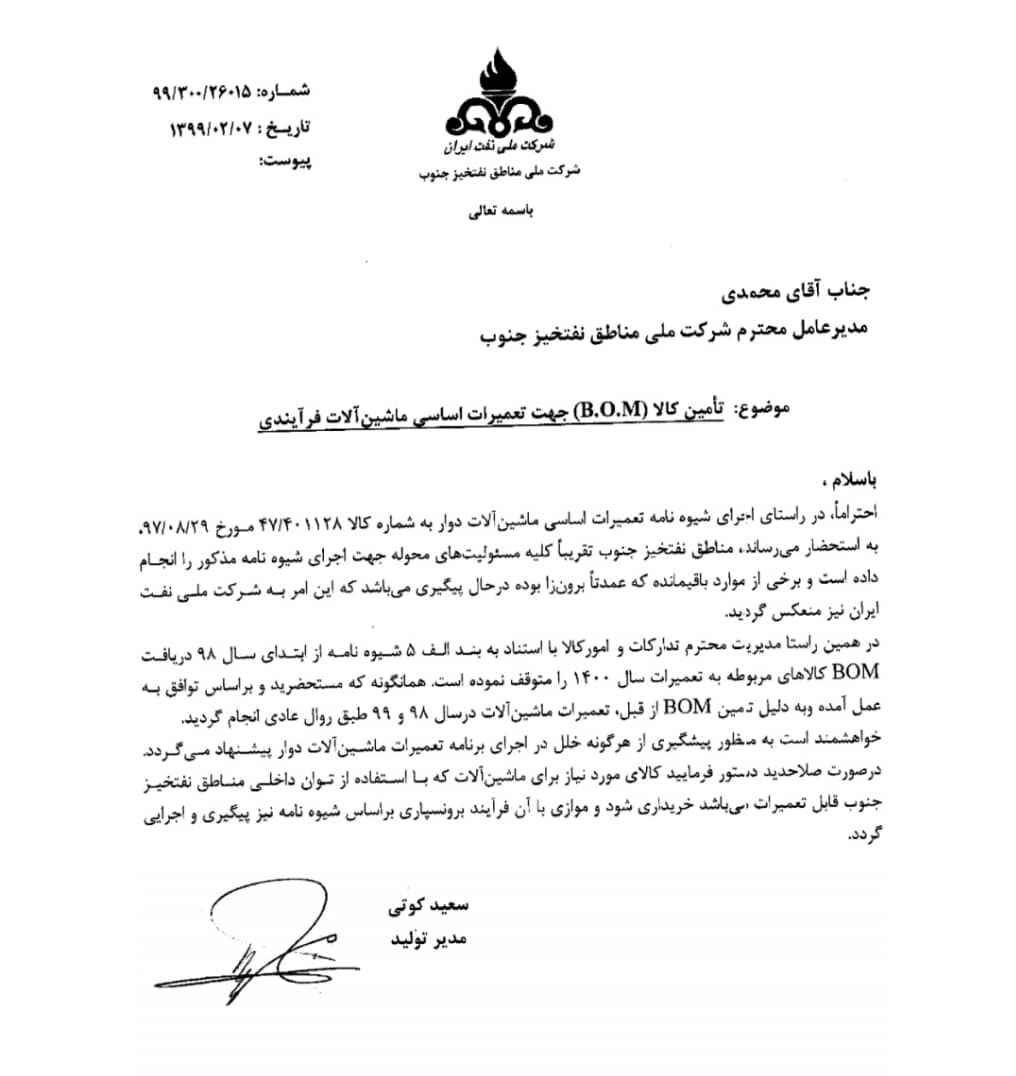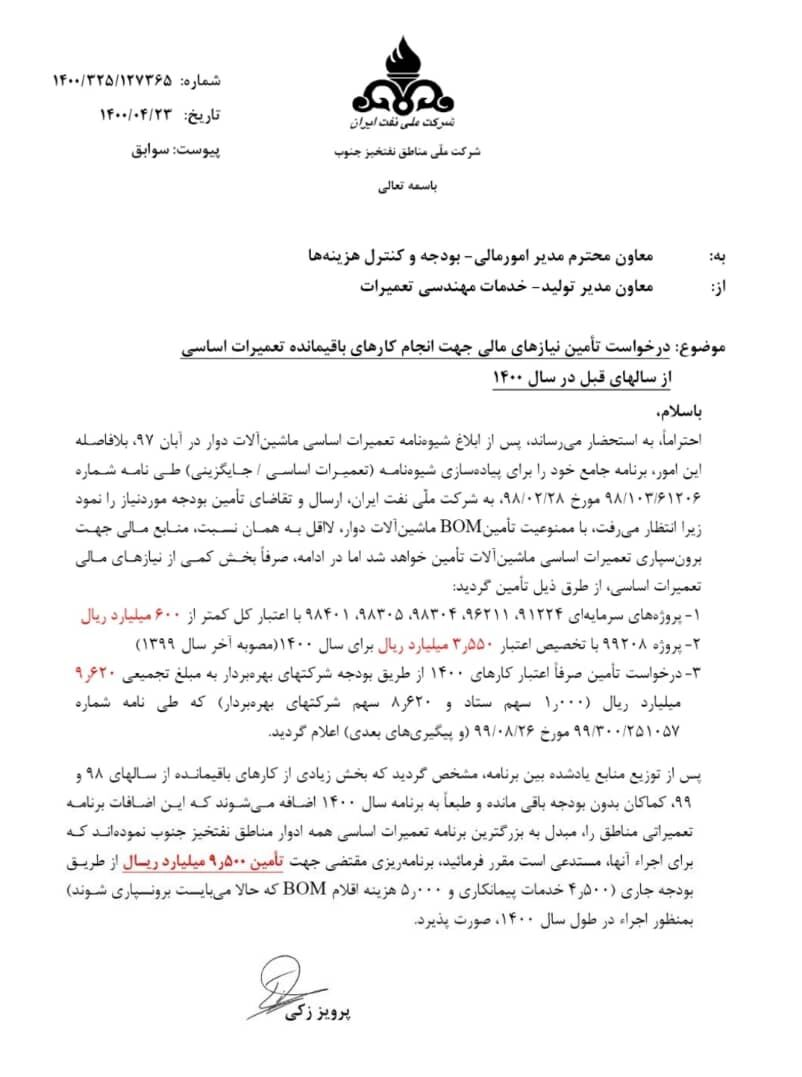Reduction of 70,000 barrels of oil production capacity in oil-rich areas / Damage to Zanganeh notifications was equal to sanctions

According to Fars News Agency and quoting the public relations of the Ministry of Oil, Hamid Driss, former technical director of the National Company for the Southern Oilfields, discussed the production capacity of the National Company for the Southern Oilfields in the first axis, referring to a recent interview with the CEO. 70,000 barrels of production capacity in the southern oil-rich areas compared to before the sanctions, he said: “Due to the conditions of the sanctions and the reduction of production obligation, sometimes it is possible that consciously or unconsciously, reductions due to natural decline in well production in the heart of statistics.” Inclusion reductions should be included, thus keeping the facts about the actual capacity and production capacity unspoken.
In this regard, he pointed to the semantic difference between the discussion of “duty reduction” and “natural decline” of production from oil fields and the need to separate the two concepts and added: Restore, repair, or drill new activities at cost and time, which sometimes lead to increased production in addition to “maintenance of production”; However, in the discussion of duty reduction, production from the reservoir is reduced for various reasons and with the will of the National Iranian Oil Company, which is not considered as a decrease or reduction in production capacity or capacity because it is part of the country’s production capacity.
The former director of technical affairs of the National Company for the South Oilfields continued with this introduction: the possibility of overlapping these two issues is important and in the conditions of sanctions, efforts should be made to prevent the confusion of these issues; Otherwise, it is possible to hide the performance weaknesses in compensating for the natural decrease in production in the form of announcing the numbers of reduced production, and it is possible that the National Company of Southern Oilfields, intentionally or unintentionally, has such perceptions in announcing its numbers. Wrong.
* Reduction of 70,000 barrels of oil production capacity
“When I took over as technical director of the National Company for the Southern Oilfields in 1997, the production capacity of the National Company for the Southern Oilfields was 2,950,000 barrels, and it was planned to take into account,” Driss said. The operation defined for the maintenance of production, at the end of the year (97) not only the maintenance of production will be completed, but also a slight increase in production capacity will occur.
He said: “In this regard, it should be noted that during the peak of oil production, the natural decline in production from oil wells will subsequently increase and the National Company of Southern Oilfields due to maximum production in 1995 and 1996, with a significant natural decline and decline.” confront with; However, the production plan was prepared to increase the production capacity and in practice it also increased the production capacity; In 1995, 486,000 barrels per day were maintained and production increased, which has been unprecedented in the history of oil-rich areas.
Driss said that this trend continued in the following years, so that the production capacity of 2 million and 950 thousand barrels per day was handed over to the new management at the beginning of 1997 and the production plan for 1997 was closed, but after that, the production plan changed. And by the new technical affairs manager of the company, the production plan with a reduction of at least 74,000 barrels compared to the previous plan, was presented to the integrated planning of the National Iranian Oil Company.
He continued: “In other words, while today the National Company of Southern Oilfields announces an increase of 70,000 barrels of production capacity, in the same year, the production program was closed with a reduction of at least 74,000 barrels compared to the company’s existing production capacity.”; Meanwhile, the oil-rich areas, according to the plan envisaged in 1997, should have faced a more natural decline in the fields due to months of maximum production. Coincidentally, the National Company for the Southern Oilfields was given a good opportunity to carry out major repairs and to maintain and increase the production capacity of the fields and to compensate for the natural decline in well production. Also, despite the reduction in production duty, which in turn reduces the rate of natural decline, in practice the production capacity of the southern oil-rich areas has decreased by about 70,000 barrels per day due to severe weakness in the implementation of incremental operations.
“Despite the sanctions, which is a good opportunity to maintain and increase production, production has not been achieved and the company’s production capacity today is less than the production capacity at the beginning of 1997,” Driss said. Kurd: Part of the lost production capacity that was hidden in the heart of the obligatory reductions in previous years by presenting false statistics, has been removed from the heart of the obligatory reductions today due to the prolongation of sanctions, but a large part of it is still inaccurate. The heart of the task reduction is hidden. That is why some may pray that sanctions remain in place, because in the shadow of sanctions one can act opaque.
The former CEO of Maroon Oil and Gas Exploitation Company further referred to the second phase of some wells in the southern oil-rich areas and said: “When the wells become the second phase, either production should be reduced or production will be accompanied by severe gas burning.” Unfortunately, the evidence indicates that the reduction in production due to the second stage wells is also hidden in the form of reduced production obligation, the consequences of which will cause challenges for the National Iranian Oil Company in the field of production.
* 36% improvement in the program of overhaul of facilities and machinery
In the second part of his speech, Driss discussed the overhaul of the rotary machinery of the National Company for the South Oilfields and said: 1998, which was prepared and sent at the beginning of 1999, the progress of major repairs and repairs of rotating machines in the regions in 1998 was about 36%, which is a very alarming number. The text of the letter also states that the percentage of realization of the repair program in 1996 and 1997 was about 78% and 56%, respectively, which indicates the downward trend in the realization of the repair program in recent years. Unfortunately, this letter will be removed from the system by the order of the CEO of the National Company for Southern Oilfields, and the relevant person who prepared the letter will be reprimanded.
Regarding the reasons for the significant difference between the repair activities and the plans, he said: “This unfavorable situation in overhauls and rotary machinery repairs is due to the consequences of the Minister of Petroleum’s notification procedure outsourcing rotary machinery repairs and sometimes due to poor performance of National Iranian Oil Company managers.” And the National Company for the Oilfields of the South.
The advisor to the Deputy Minister of Petroleum for Supervision of Hydrocarbon Resources said about this circular: “Even assuming that the nature of this procedure is flawless, there is a question why such a procedure does not include” time lapse “? How is it possible to immediately outsource all repair contracts for about 20,000 rotating machines in the southern oil-rich areas, regardless of the transition period? Given the activity of this number of rotating machines in this company, was there such a capacity for repairs in the private sector of the country? Given that the directive required that all previous orders be suspended (unless the contractor was identified) and that ordering the goods needed to repair the machinery was too time consuming, it was not estimated what the damaging consequences of this directive would be. ? Following this circular, Aghajari’s workshop, which is unique in its kind in the region, was put on the verge of auction, and finally, due to the method that was prepared and presented to the officials by the servant and a number of experts at that time. The transfer of Aghajari Central Workshop was prevented. In other words, after the announcement of the Minister of Petroleum, in order to reduce the negative consequences of that policy, another alternative policy was developed, which, although it was never officially announced and replaced the policy, but at least could prevent further damage.
Driss referred to the May 1999 letter from the Production Manager of the National Company for Southern Oilfields, entitled “Declaration of Consequences of Non-Supply of Goods (BOM) for Overhaul of Process Machinery in the Process of Implementing the Overhaul Procedure” and added: In the case of the above temporary license (purchase of program goods), it can cause serious problems in the supply of machinery goods, a process that usually takes about two years, and the consequences of not performing major repairs of machinery and thus stop production and gas burning. Will bring “; This letter will be removed from the system by the order of the CEO of the National Company for Southern Oilfields and will be replaced with another letter.
He added: “A very important warning to stop production, which was mentioned in the deleted letter of the production manager, and also includes refinery and municipal gas production, and could endanger the country’s energy security, should be seriously considered and followed up immediately by the CEO.” It was placed and reflected to the National Iranian Oil Company, not removed from the system by pressure on the production manager. Basically, such behaviors and pressure to change the technical views of managers do not beautify any official in the Islamic Republic, especially the oil industry.


He said that the National Company for the South Oilfields, which has a high capacity in repairing rotating machines, also benefited from the power of the private sector in repairing, referring to the problems of outsourcing only for repairing rotating machines, and pointed to an example of the company’s order. In line with the same directive, the National Company for Southern Oilfields, in a letter to the Persian Gulf Petrochemical Holding, overhauled 27 of its rotary machines and emphasized that due to the importance of these machines, the machines should be delivered to the regions within 75 days. Unfortunately, in a situation where these repairs were very urgent for the regions, the holding responded to the letter of the regional director after about 20 days and announced that we were unfamiliar with the machines and their repair methods and did not know the spare parts and manufacturers and suppliers. These parts, we are not able to perform repairs in this period of time, and if you have such a request, we can operate this process in 6 or 7 steps, and officially announced that they can not repair these 27 devices.
Asked why a directive should have forced the National Company for the Southern Oilfields, Driss, despite having significant repair potential and an urgent need to repair machinery, spent time writing to a company that did not have the capacity to meet the needs of the regions. “As soon as this circular was issued, the director of building engineering of the National Company for Southern Oilfields, the director of industrial repairs and process equipment of the company and the deputy director of production in the field of repairs and a number of other managers, wrote a letter to the director of regions. They criticized this method. Perhaps if these critical letters were referred to Tehran, the procedure would be somewhat modified and corrected.
He continued: “But the director of the regions, without reflecting on these criticisms, announced in a letter that he would implement this directive within 2 years and prepared a 2-year implementation plan, which was never implemented due to the unrealistic method and program.” The CEO of a collection can help improve decision-making by reflecting on the expert decisions of his collection; This was not done by the CEO of the National Company for the South Oilfields.
Driss criticized the re-announcement of this policy in the twelfth government, stating that it had been announced by Bijan Zanganeh in 1982 and its implementation was stopped in the ninth government. Much of this backwardness goes back to the same style that gradually showed its effects in the area repair program. In July of this year, a letter was sent by the Deputy Production Manager of the National Company for Southern Oilfields to the Deputy Finance Director of the company, requesting to meet the financial needs for the remaining overhaul work from previous years in 1400. “Much of the work left over from ’98 and ’99 is still without funding and will naturally be added to the 1400 plan, which has made the regional repair program the largest overhaul program of all time in the oil-rich southern regions,” the letter said. . This is in stark contrast to a recent interview with the CEO of the National Company for the South Oilfields.

The former director of technical affairs of the National Company of Southern Oilfields stated: In general, due to the reduction of production capacity in 1997, lack of proper handling of facilities and rotating machines, the second stage of some wells and hidden reductions, the National Company of Southern Oilfields to maintain The production capacity presented in the official reports has difficult and challenging conditions ahead.
Driss continued: “Unfortunately, the procedure that prevailed in the circular on outsourcing repairs of rotating machines, continued in the development plan of 28 reservoirs, and it was announced that areas other than the packages of this plan are allowed to carry out any development activities, maintenance and increase production in other reservoirs.” It is not the wells that, if this directive had not been resisted, would have damaged the oil industry as much as the total sanctions, which is a very detailed discussion and will be discussed in due course.
End of message /
.

